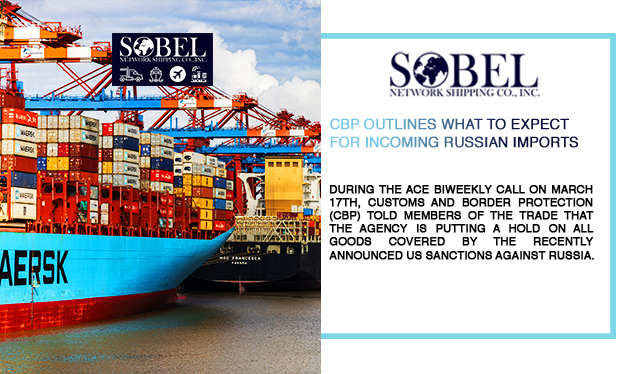During the ACE biweekly call on March 17th, Customs and Border Protection (CBP) told members of the trade that the agency is putting a hold on all goods covered by the recently announced US sanctions against Russia. CBP Will release goods that are being held under the OFAC General License 17, upon receipt of proof that shipment was under contract prior to March 11, 2022, so long as they were received prior to March 25th. The OFAC General License 17 states:
“(a) Except as provided in paragraph (b) of this general license, all transactions prohibited by section 1(a)(i) of Executive Order of March 11, 2022, Prohibiting Certain Imports, Exports, and New Investment With Respect to Continued Russian Federation Aggression, that is ordinarily incident and necessary to the importation into the United States of fish, seafood, and preparations thereof; alcoholic beverages; or non-industrial diamonds of Russian Federation origin pursuant to written contracts or written agreements entered into prior to March 11, 2022, is authorized through 12:01 a.m. eastern daylight time, March 25, 2022.
(b) This general license does not authorize any transactions otherwise prohibited by the Russian Harmful Foreign Activities Sanctions Regulations, 31 CFR part 587 (RuHSR), including involving any person blocked pursuant to the RuHSR, unless separately authorized.”
In short, as determined by the Secretary of the Treasury as a part of the March 11th Executive Order by the White House, the US will ban certain Russian-origin imports such as fish, seafood, and preparations thereof; alcoholic beverages; non-industrial diamonds; and any other products of the Russian Federation origin.
“Importers can avoid the hold by submitting proof to CBP ahead of time,” CBP Director of Cargo Security and Controls James Swanson stated. He added, “CBP wants to keep cargo moving, especially perishable seafood.” He also suggested that “Companies should look to divert the sanctioned cargo elsewhere if it will not arrive here in time.” All goods covered by the restriction will be refused entry starting March 25th, even if they were under contract in time.
“Importers/filers should contact CBP at the ports of entry where these goods are arriving, submit proof of contract, via fax, in person, or even via DIS (other docs) when filing entry,” Swanson recommended. He added, “CBP at the ports of entry is also contacting importers/filers, especially for perishable larger shipments.”
If you would like a list of the HTS codes covering prohibited goods, this list is provided in the Treasury Department Office of Foreign Assets Control (OFAC) FAQs, or you can contact your Sobel representative to help you navigate these codes, to make sure you are up to date with what can and cannot enter the US as of March 25th. Should you have any other questions regarding this matter, please do not hesitate to contact your Sobel representative today.


